|
|
|
Sort Order |
|
|
|
Items / Page
|
|
|
|
|
|
|
| Srl | Item |
| 1 |
ID:
108704


|
|
|
|
|
| Publication |
2011.
|
| Summary/Abstract |
Agricultural liberalization is one of the most contentious trade issues in Japan and Korea. Yet, important differences characterize the Japanese and Korean governments' positions on agricultural liberalization when negotiating on free trade agreements (FTA). The Korean government supports substantial agricultural liberalization, whereas the Japanese government is reluctant to abandon farm interests even at the risk of undermining its FTAs. Given strong similarities in their agricultural structure and politics, how do you explain divergent government positions between Japan and Korea? The structure of a country's domestic trade governance largely explains the Japanese and Korean governments' varying approach to agricultural liberalization during FTA negotiations. Domestic trade governance refers to the decision-making structure and process on foreign economic policies. Cohesive domestic trade governance enabled the Korean government to pursue agricultural liberalization under the broader national agenda of promoting trade through FTAs. In contrast, fragmented domestic trade governance gave disproportionately larger weight to agricultural interests within the Japanese government, ultimately allowing agriculture to undermine the success of Japan's FTAs.
|
|
|
|
|
|
|
|
|
|
|
|
|
|
|
|
| 2 |
ID:
108709
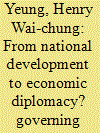

|
|
|
|
|
| Publication |
2011.
|
| Summary/Abstract |
This paper examines the changing role and governance of Singapore's two sovereign wealth funds (SWFs) over the past three decades - from their earlier participation in domestic national development to their more active involvement in Singapore's economic diplomacy. Based on a variety of sources and data, I argue that these two SWFs, Temasek Holdings and the Government of Singapore Investment Corporation, are state-sanctioned means to secure the economic future of Singapore; they are not strategic devices developed by the Singapore government to pose geopolitical or economic threats on other states. Over time, their economic functions and strategic orientations have evolved with the city-state's dynamic developmental trajectories in the global economy. In the post-Cold War era of global finance, these state-controlled and professionally managed financial investment vehicles are more visible and active in their global expansion and acquisition trails. There are thus significant challenges to their strategic governance and international legitimacy in this new world order. This paper considers some of these challenges in light of recent development in the two SWFs and assesses their organizational and institutional responses to such challenges in today's competitive global economy. This case study of Singapore's SWFs illustrates the critical importance for understanding the rise of SWFs from small states in the evolving global system.
|
|
|
|
|
|
|
|
|
|
|
|
|
|
|
|
| 3 |
ID:
108705
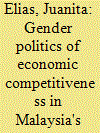

|
|
|
|
|
| Publication |
2011.
|
| Summary/Abstract |
Many academic commentators have pointed to how the widening and deepening of a neoliberal reform agenda in Southeast Asia has brought about the end of developmental forms of state governance and the emergence of less directly market interventionist states pursuing economic 'competitiveness'. In this paper, I note how notions of competitiveness are increasingly fused with ideas regarding the contribution of gender equity and women's empowerment to national economic success. However, drawing upon a case study of Malaysia, this paper highlights how government policies stressing both the marketisation of social reproduction and the need to expand women's productive roles are constantly brought into tension with embedded social structures. Such an emphasis is essential to any understanding of the role of the Malaysian state in economic development - a role that has been fundamentally shaped by a localised politics of ethnicity. The paper draws upon examples from government policy-making that conceptualise women as key workers in the emerging knowledge-driven economy and as microentrepreneurs driving pro-poor economic growth and illustrates how such policies are brought into tension with traditionalist discourses concerning the appropriate role of women in society.
|
|
|
|
|
|
|
|
|
|
|
|
|
|
|
|
| 4 |
ID:
108706
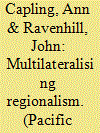

|
|
|
|
|
| Publication |
2011.
|
| Summary/Abstract |
The Asia-Pacific region is home to a large and rapidly growing number of preferential trade agreements (PTAs). These agreements differ widely in design, scope and purpose. The "noodle bowl" that has resulted runs the risk of distorting investment and trade. Neither global institutions (the WTO) nor regional institutions such as the Asia Pacific Economic Cooperation (APEC) grouping have successfully addressed these issues. Amidst this increasingly messy situation, the proposed Trans-Pacific Partnership (TPP) agreement stands out for a range of important economic and political reasons, not least of which is its potential to take existing PTAs in the Asia-Pacific region in a new direction. The aim of the TPP negotiators is to produce a comprehensive, high quality, multi-party agreement to tame the tangle of PTAs and be a potential stepping stone to achieving the goal of liberalizing regional trade on a non-discriminatory basis. The economic gains from removing border barriers among the countries involved in the initial TPP negotiations are likely to be limited, however, given the small size of many of the economies and the existing PTAs among them. To date, the US has been unwilling to offer a single set of arrangements for all TPP partners, preferring to build on existing bilateral agreements. Pessimism about the immediate results from the TPP should be tempered, however, by considerations of the dynamics that it might set in train; on the other hand, it has the potential to divide the region and exacerbate China's concerns about "containment".
|
|
|
|
|
|
|
|
|
|
|
|
|
|
|
|
| 5 |
ID:
108708
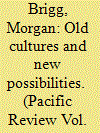

|
|
|
|
|
| Publication |
2011.
|
| Summary/Abstract |
Prevailing approaches to managing international relations are heavily influenced by the European legacy and associated understandings of diplomacy and order. To explore possibilities for expanding beyond these approaches, this paper examines an exchange that is particularly curious and provocative from an Australian vantage: the longstanding seafaring connection between Australian Aboriginal people of northeast Arnhem Land and people of what is present-day Eastern Indonesia. First, the paper makes an argument for moving beyond the developmentalist view that modern diplomacy and conflict management arise with the expansion of European influence. It then introduces a conceptual frame which opens to other ways of approaching political life and relations across difference by thinking in terms of three distinct yet overlapping forms of socio-political order - the traditional-mythical, the prophetic-religious and the modern-bureaucratic. Turning to the Aboriginal-Indonesian connection, I provide an overview of the relationship and academic approaches to it before examining a number of puzzles surrounding how we might know this relationship. Grappling with these puzzles shows that the Marege'-Makassar connection mobilises a flexible and 'relational' approach to socio-political order in contrast with the exclusionary sovereign logic of the modern nation-state. Experimenting with relationality promises to broaden and deepen our contemporary approach to diplomacy and international relations in the region and beyond.
|
|
|
|
|
|
|
|
|
|
|
|
|
|
|
|
| 6 |
ID:
108707
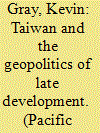

|
|
|
|
|
| Publication |
2011.
|
| Summary/Abstract |
Through a case study of Taiwan, this paper seeks to address recent debates surrounding the transformation of developmental states in East Asia. Whilst a number of authors have cited the Taiwanese state as being both cautious and resilient in the midst of global restructuring, this paper seeks to critically engage with such arguments by highlighting the dynamic and mutually constitutive relations between the forms of social relations that underpin late development and the wider geopolitical system in which such development occurs. Specifically, Taiwanese industrialisation can be viewed as an outcome of the US intervention in the Chinese civil war and subsequent exclusion of China from the regional political economy in the period between the Korean and Vietnam Wars. The Kuomintang (KMT)'s retreat to Taiwan established the basis for the autonomous developmental state, and the US underpinned this state through military protection, aid and access to its own domestic market. However, the relative decline of US hegemony and the readmission of China into the international system have posed significant challenges to Taiwan's developmental state. The US sought to redress its trade imbalance with East Asia by placing pressure on Taiwan to liberalise its political economy. Furthermore, the very process of development itself served to undermine the autonomy of the state as it came under pressure from new social forces. Taiwan has more recently been faced with a dilemma of closer integration with the mainland or the maintenance of its de facto economic and political independence at the risk of becoming isolated from the global trading system.
|
|
|
|
|
|
|
|
|
|
|
|
|
|
|
|
|
|
|
|
|